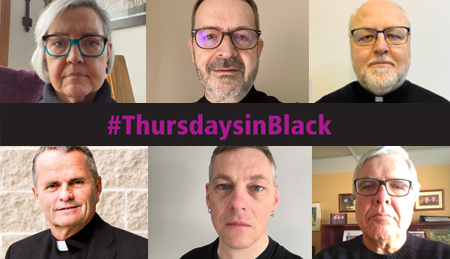ELCIC National and Synod Bishops write to the church to express their ongoing concern for domestic violence in our country and within our church.
“We know that this is an uncomfortable subject for some people to discuss and too often this has stopped us from speaking out,” say the Bishops. “But we must speak out and advocate for those who are living in these dangerous situations.”
Social isolation and current lockdown measures have led to this dramatic increase in domestic violence. The UN describes this as shadow pandemic alongside COVID-19, “a pandemic within a pandemic.”
As a member fo the World Council of Churches, the ELCIC joins with other church in lifting up Thursdays in Black – a weekly reminder of our commitment to end gender-based violence including domestic violence.
You are invited to join in this campaign by wearing black on Thursdays and posting your commitment to ending gender-based violence.
Read the full letter here: https://elcic.ca/documents/202103pastoralletterredomesticviolence.pdf
The text of the letter follows.
March 4, 2021
Dear members of the Evangelical Lutheran Church in Canada,
We write to you today out of ongoing concern for domestic violence in our country and within our church. Especially troubling is the recent rise in domestic violence. The realities of the COVID-19 pandemic have made those living in difficult and dangerous situations only worse while at the same time limiting access to family and other support systems.
We know that this is an uncomfortable subject for some people to discuss and too often this has stopped us from speaking out. But we must speak out and advocate for those who are living in these dangerous situations.
Social isolation and current lockdown measures have led to this dramatic increase in domestic violence. The UN describes this as shadow pandemic alongside COVID-19, “a pandemic within a pandemic.”
In a survey last year of 376 staff and volunteers working at transition houses, shelters, immigration centres and other social agencies coast-to-coast, almost half said they noticed changes in the prevalence and severity of violence. 82 per cent said the violence had increased and got more frequent. A fifth said abusers’ violent tactics changed and control over their victims increased, including a sharp uptick in cases of strangulation. There have been “many more cases of strangulation and serious physical assaults leading to a higher risk of lethality,” said one worker surveyed.
As a member of the World Council of Churches, the ELCIC joins with other churches in lifting up Thursdays in Black—a weekly reminder of our commitment to end gender-based violence including domestic violence (www.oikoumene.org/what-we-do/thursdays-in-black). You are invited to join in this campaign by wearing black on Thursdays and posting on social media your commitment to ending gender-based violence.
In November 2020, Thursday in Black Ambassadors issued a statement urging both awareness and protection from the dual pandemics of COVID-19 and gender-based violence.
“Gender-Based Violence is not only physical, it is emotional, mental and even structural,” said the ambassadors. “We know that violence against women and girls occurs virtually and literally in every strata of society: in households, at school, in religious spaces and in the workplace. And with ongoing physical restrictions due to the spread of the coronavirus, violence against women and girls has intensified. The resolve to end Gender-Based Violence must remain strong.”
National Bishop Susan Johnson and Presiding Bishop Elizabeth Eaton of the Evangelical Lutheran Church in America (ELCA) also released a joint video in November 2020, speaking out against domestic violence.
“This isn’t just a role for church leaders. All of us are all called, through our baptismal vocation, to this work,” said the leaders. “Jesus Christ calls each Christian, and the whole church, to denounce and stop the beating, sexual abuse, raping, and killing that take the lives and safety of people everywhere. All of us can encourage greater awareness, support the work of organizations that provide safe spaces, and advocate for preventative policies at all levels of government.”
As a church we are called to journey in solidarity with those who are experiencing hurt, brokenness or exploitation. Our 2011 Social Statement on Human Sexuality calls on us to, “deepen our awareness of the root causes of sexual injustice and exploitation…[and] advocate for policies, practices and resources that uphold dignity and address particular issues surrounding sexuality.”
If you or someone you know are experiencing domestic violence you can find resources for help here: https://endingviolencecanada.org/getting-help-2/.
We encourage you to reflect on your own sense of discomfort around this issue and adopt practices that nurture your courage and wisdom for action. We also encourage all leaders and faith communities to maintain a list of relevant resources in your area.
It’s time for all of us to break the silence and speak up against domestic violence. Our hope and prayer is that you will join us in speaking up, advocating for better services for victims, and speaking out against male privilege that allows domestic violence to flourish and to remain hidden.
Yours in Christ,
The Rev. Susan Johnson
National Bishop, ELCIC
The Rev. Dr. Greg Mohr
Bishop, British Columbia Synod
The Rev. Dr. Larry Kochendorfer
Bishop, Synod of Alberta and the Territories
The Rev. Dr. Sid Haugen
Bishop, Saskatchewan Synod
The Rev. Jason Zinko
Bishop, Manitoba/Northwestern Ontario Synod
The Rev. Michael Pryse
Bishop, Eastern Synod




